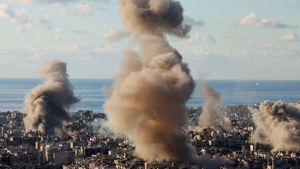The Syrian civil war, which has wreaked havoc for over thirteen years, has recently flared up once again with alarming intensity. The unexpected capture of Aleppo, Syria's second-largest city, by rebel forces over the past weekend has taken the world by surprise and reignited fierce fighting between the government and opposition forces. Led by the Islamist group Hayat Tahrir al-Sham (HTS), the offensive marks the first substantial territorial gain for the rebels against President Bashar al-Assad's regime since government forces overtook the city six years ago.
On November 26, 2024, the rebel offensive commenced with HTS and its allies launching coordinated attacks from their strongholds to the north. Within days, they seized control of Aleppo, securing both the city and its airport, prompting immediate military responses from Assad's forces, backed by Russia and Iran. Airstrikes were initiated to reclaim lost territory, resulting in significant casualties among both combatants and civilians.
The Syrian Observatory for Human Rights reported at least 514 fatalities since the fighting resurfaced, highlighting the civilian toll amid military skirmishes. The panorama of devastation has raised fresh concerns about the humanitarian crisis, particularly as civilian areas have been caught up in the conflict, often targeted by airstrikes.
One of the key players behind this sudden resurgence of hostilities is Hayat Tahrir al-Sham. Although often labeled as terrorists due to their past affiliations with al-Qaeda, HTS has sought to distance itself from such groups, presenting itself as primarily focused on domestic issues and governance. This shift has enabled HTS not just to dominate the Idlib province, but also to emerge as the leading rebel faction capable of challenging Assad’s authority directly.
Eyewitness accounts from Aleppo reveal scenes of jubilation among some residents as breakthrough rebel forces occupied the streets, clashing with remnants of the government military. Dressed in military fatigues, rebels were seen tearing down government propaganda and raising their distinctive flag, representing the revolutionary movement. "We are coming to Damascus!" some shouted, vowing to consolidate their gains and push on toward the capital.
Initial backlash against HTS's advance came rapidly from major world powers. The United States and several European nations have called for de-escalation and urged all parties involved to cease hostilities, stressing the need to maintain safety for civilians and humanitarian access within the war-torn country. This plea reflects fears of the burgeoning conflict spilling over and drawing neighboring powers like Russia and Turkey more deeply. Turkey, which has a strategic interest to prevent any resurgence of Kurdish forces linked to the PKK—as well as to manage it refugee flow—has held its support for the rebels but remains wary of their militant ambitions.
Assad’s response to this shocking turn of events has been one of defiance. He condemned the insurgents as merely terrorists and vowed to reclaim lost territories. Reports emerge of thousands of reinforcements being sent to the north as the military ramps up its efforts through aerial bombardments aimed at neutralizing the HTS threat.
Strategically, Aleppo holds substantial importance due to its geographic position. The city once thrived as Syria's economic powerhouse, and control over it would significantly bolster the moral and material resources of any faction, be it the government or rebel groups. Historically, Aleppo has witnessed some of the civil war's most intense battles, and capturing it once again casts longstanding shadows over those embattled streets. Civilians, already suffering from years of conflict, face the brunt of these renewed clashes.
Observers have pointed out the deteriorated state of Assad’s allies, particularly Hezbollah and Iran. Their commitment has wavered due to the prolonged conflict with Israel and challenges posed by the upheaval of relations with other regional players. The weakening of these alliances appears to have emboldened the rebels who are now taking risks they might have avoided previously.
The situation continues to evolve. International concern about civilian casualties has been met with airstrikes and fierce local battles. The United Nations has expressed alarm over the developments, emphasizing the need for political solutions to what seems to be just another violent chapter of the protracted war.
While the war had appeared to reach some form of stalemate, the recent aggressive moves by HTS have not only disrupted the existing balances but also raised questions about whether the remnants of the Assad regime can sustain their hold over the country. Responses from global actors and neighboring countries will be pivotal as these tensions escalate. The local atrocities serve as constant reminders of the human cost this conflict continues to reap.
With Assad's forces facing challenges on multiple fronts, the upcoming period could be decisive. The HTS offensive poses not only immediate threats to Assad's hold on power but may change the entire diplomatic calculus concerning Syria—one where the U.S., Russia, Turkey, and Iran all have vested interests.
The outcome of the battle for Aleppo and its surrounding neighborhoods could spell disaster or potential opportunity for peace talks, depending on military outcomes on the ground. Until then, the Syrian people remain caught between the crossfire of conflicting ambitions and dwindling hopes for peace.



